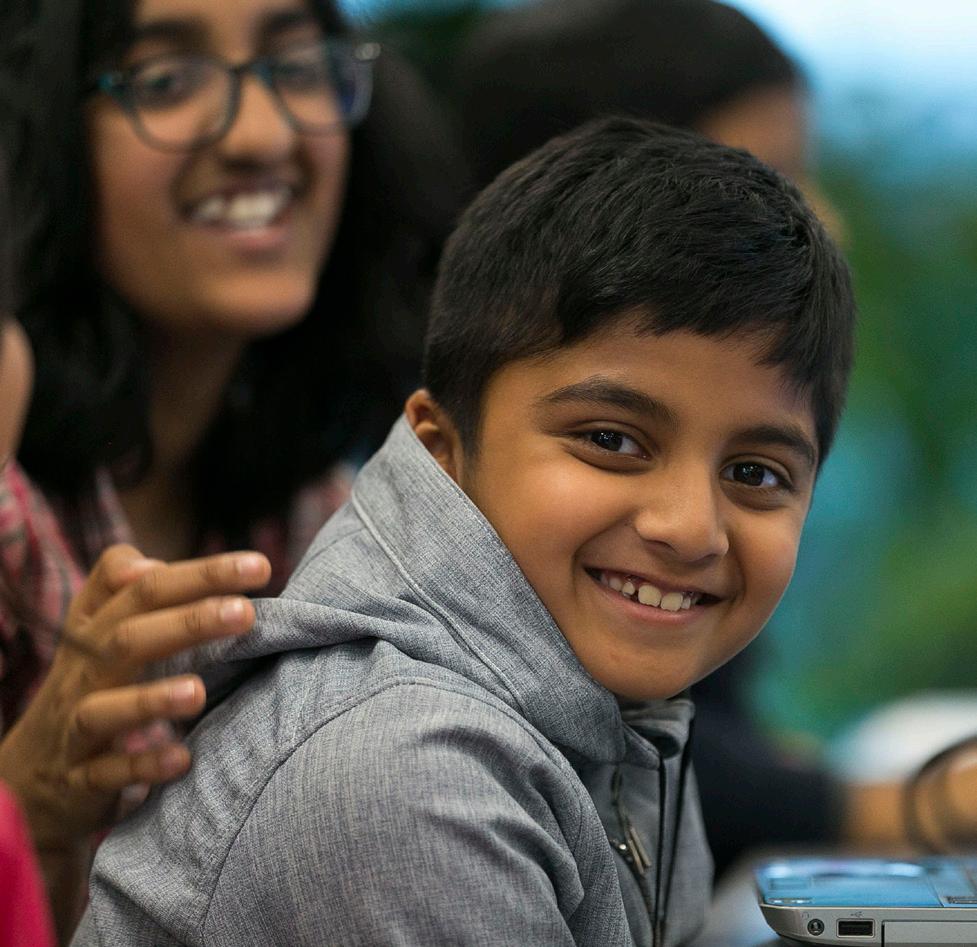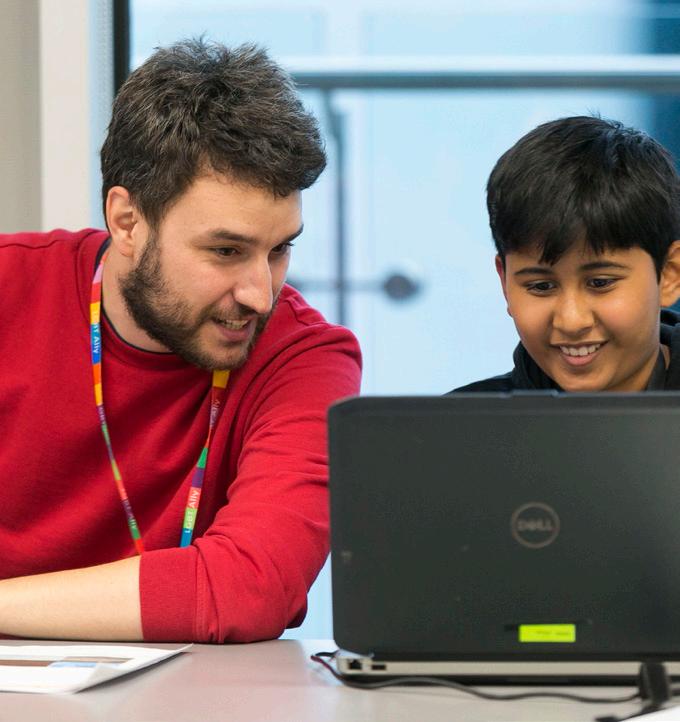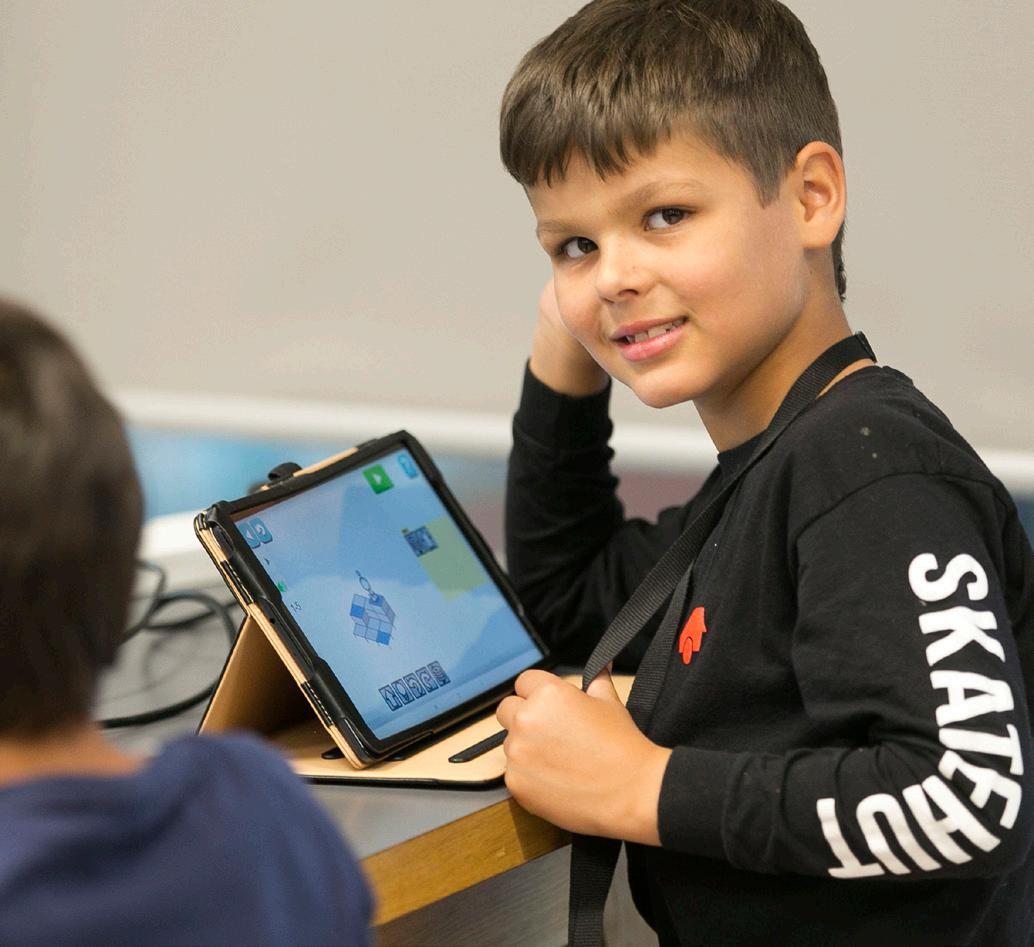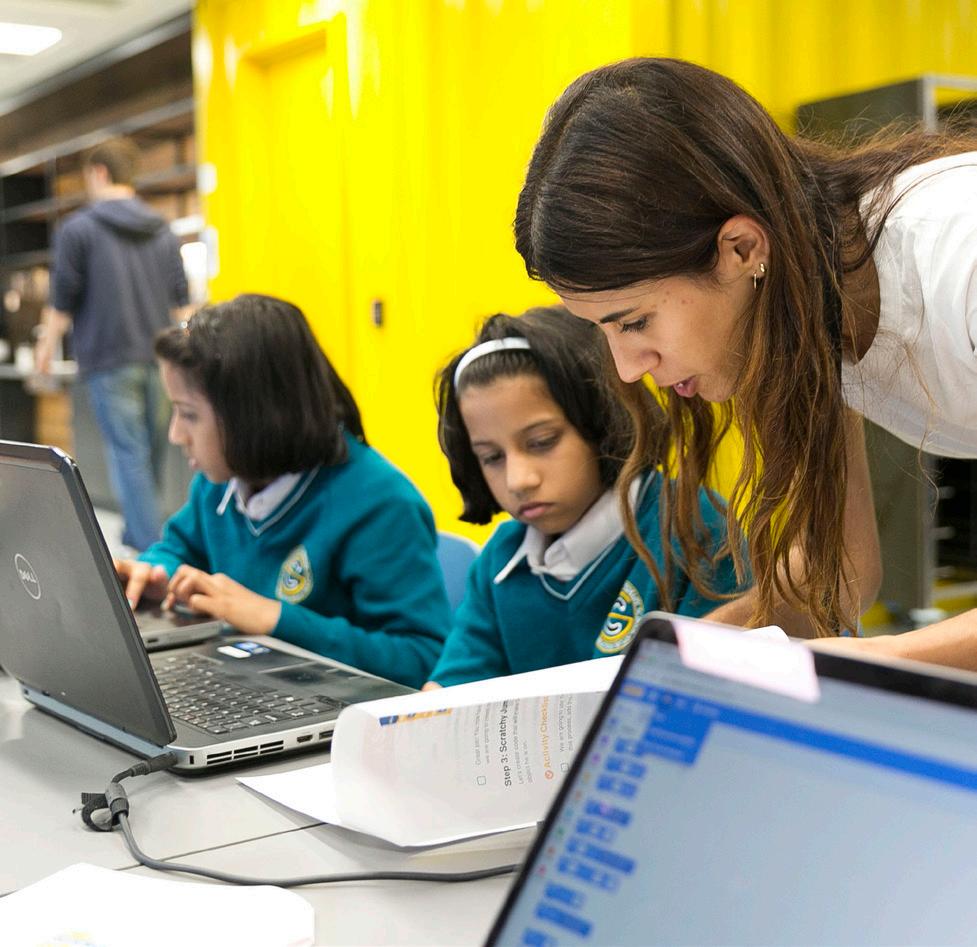
8 minute read
Coder Dojo
CODERDOJO TURNING MILK BOTTLES INTO ROBOTS 30 SF SOCIETY \ AUTUMN 2019 SPECIAL REPORT

Dave Sumner Smith
Advertisement
DAVE SUMNER SMITH
Having originally started as a motoring journalist, editor and magazine publisher, Dave went on to run business networks for The Sunday Times and The Daily Telegraph plus multiple LinkedIn groups for Oracle and The Wall Street Journal.
TURNING A MILK CARTON INTO A ROBOT IS NOT THE SORT OF WORK ONE WOULD EXPECT TO FIND AT ACCENTURE’S OFFICES AT THE DOCK IN DUBLIN. SEEING MECHANICAL HANDS BEING BUILT FROM STRAWS COMES AS A SURPRISE TOO. BUT THIS IS NOT IDLE TIMEWASTING: QUITE THE OPPOSITE.
Such work is part of the CoderDojo programme on which Accenture and Salesforce collaborate to help children learn about programming. It now involves 12,000 volunteers in 107 countries helping 58,000 children to discover the joy of coding.
It was just a ‘scrappy start-up’ with seven staff when Cyril Treacy came across the Irish not-for-profit organisation. CoderDojo had been set up by James Whelton and Bill Liao in Cork in July 2011. It caught the attention of the Salesforce VP of Industry and Solution Architects because Treacy wanted his two daughters to get interested in technology.
“I.T is the best career in the market right now,” he explains, “but nobody was explaining that to children or encouraging their enthusiasm.” Treacy recognised CoderDojo’s approach offered something new by making learning fun. Instead of calling it a coding club, they used the Japanese word Dojo more commonly applied to martial arts clubs and referred to the young participants as Ninjas.
it’s essential to encourage children from all backgrounds to learn about computing. “This is particularly true for girls,” he says. “Many girls are good at maths, so they will probably be good at coding. But their schools encourage them to pursue careers in finance or accountancy – despite the fact such professions will soon be done by bots. Instead they should be focused on the plethora of new jobs like ‘data scientist’
But the fun terms couldn’t disguise the fact CoderDojo was burning through the funds provided from VCs. So Treacy helped CoderDojo use the not-for-profit version of Salesforce to track donations. He also tested the principles by recruiting 10 ‘mentors’ to run early evening Dojos for employees’ children in Salesforce offices.
H av i n g t h e n a t t r a c te d n i n j a s f r o m disadvantaged homes in the surrounding area, the Salesforce team created an FAQ section and made other improvements to the coderdojo.com website. With ever growing demand for computing skills, he believes
Treacy’s passionate campaigning for the ethos of making coding fun for boys and girls helped to secure $300,000 of early stage funding for CoderDojo, making Salesforce one of the leading sponsors. Even more important, Treacy believes, is the amount of time and effort invested by Salesforce staff, which amounts to more than 8000 hours in 16 countries.
Salesforce brought CoderDojo to the World Economic Forum at Davos and also took the CoderDojo ‘Digital Girl of the Year’ to Dreamforce in 2014, attracting the attention of Marc Benioff and helping to secure further
funding. Treacy’s passion is infectious. “Most of the girls’ parents would aspire for them to be a hairdresser or a beautician or to work in a supermarket,” he says with excitement. “ But we’re mentoring them in robotics!”
His passion is shared by Julie Spillane, M a n a g i n g D i r e c to r o f C o m m e r c i a l Management at Accenture, who met in Dublin to explore their shared vision. “The pace of change in technology is incredible,” she says. “My children of 10 and 12 will be
study things at university I’ve never heard of. Coding is part of the language of the future.”
CoderDojo fits neatly with Accenture strategy in three key ways, she explains. Firstly it aligns neatly with Accenture’s $200 million Skills to Succeed programme. “This aims to equip 3 million people around the world with digital skills for the workplace by the end of 2020. We truly believe it is critical to build these skills early so that future generations can thrive in the workplace of the future and CoderDojo shares that vision.”
Secondly it fitted with Accenture’s ability to scale very quickly. “So when we have an idea,” says Spillane, “we have a huge global community that we can partner with to develop and expand it out globally – that’s what we did with CoderDojo. We started the first Accenture Dojo in 2016 at The Dock, our flagship R&D and Global Innovation Centre in Dublin, Ireland. Since then we’ve grown to a network of 40 Dojos around the world including in Mexico, Chile, Brazil, Colombia, India, South Africa, the United States and Spain.”

Julie Spillane - MD Commercial management, Accenture

Cyril Treacy - VP Industry & Solution Architects, Salesforce
Clockwise, from top left: Cyril Treacy - VP Industry & Solution Architects, Salesforce, Julie Spillane - MD Commercial management Accenture, Coder Dojo Class
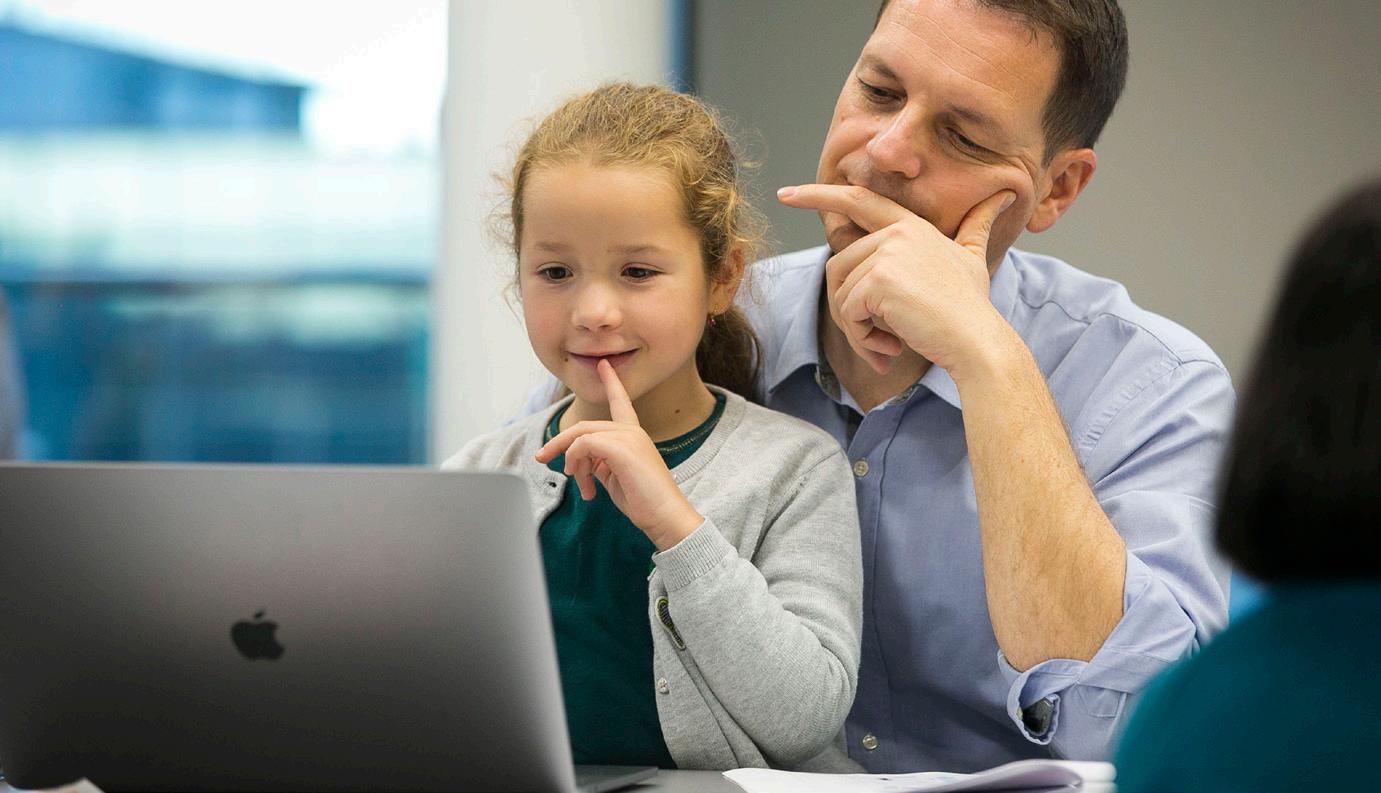
Like Salesforce, Accenture also recognised the importance of not only running Dojos for children around the world, but also working with the CoderDojo organisation to build its capabilities. We’ve worked with our own clients and partners,” says Spillane, “to help CoderDojo to grow by establishing relationships with new Growth Partners – a global network of organisations working to grow the CoderDojo movement of free coding clubs for young people around the world. We also developed a toolkit for CoderDojo of our learnings and best practices, so others can get up and running quickly.” Already new organisations have come on board thanks to the Accenture-developed toolkits.
Spillane and Treacy have been ‘slingshotting’ each other to build on each others’ ideas and experiences. The two companies now work together as ‘growth partners’ to attract further support from other corporations and drive CoderDojo forward toward its target of 5000 Dojos by the end of 2020.
Key to this growth was the Raspberry Pi Foundation becoming a corporate member of the CoderDojo Foundation in May 2017, building on the organisation’s impressive credentials. But equally important has been the Dojo’s popularity amongst volunteers within Salesforce, Accenture and elsewhere.
In the year to August 2019, for example, the number of Accenture mentors grew from 240 to 400, undertaking more than 9000 hours of tuition for 1,100 ninjas in more than 40 Dojos across the world.
CoderDojo works in multiple languages, explains global community manager Nicola Lyons, and operates in 107 countries including Columbia, Yemen and Iraq. “There are 30 Dojos in Sri Lanka, for example”, she says, “run by 300 volunteers there.” Many of the Dojos operate from Salesforce and Accenture offices, but the majority are run from the offices of smaller local businesses and public buildings such as libraries.
In some countries such as Chile and Mexico,
Dojos are for girls only, but in most other nations the target is for an equal gender balance. Children aged from 7-17 are split into different age groups to ensure a suitable menu of content and activities.
“My dad brought me to my first Dojo when I was 9,” says 16-year old Aaron Groome. “I loved using logic to solve challenges and problems.”
His determination paid off, when he won Best App in the recent ‘Coolest Project’ Awards. “My project was a ‘Load of Rubbish’,” he says with a giggle. “I wanted to develop an App that allowed you to know which bin you should use for recycling.”
He wanted to cross-reference product identifiers from Google’s Cloud Vision API with Dublin City Council’s recycling guidelines. “I made multiple attempts and had many sleepless nights in the final week before the submission deadline. But I got there just in time.”
Having access to CoderDojo mentors with a wealth of knowledge about diverse subjects is invaluable, explains Groome. “Working with CoderDojo has helped me believe in myself,” he adds. “Greta Thunberg is my inspiration. Now I can see the things she’s achieved and other really amazing things
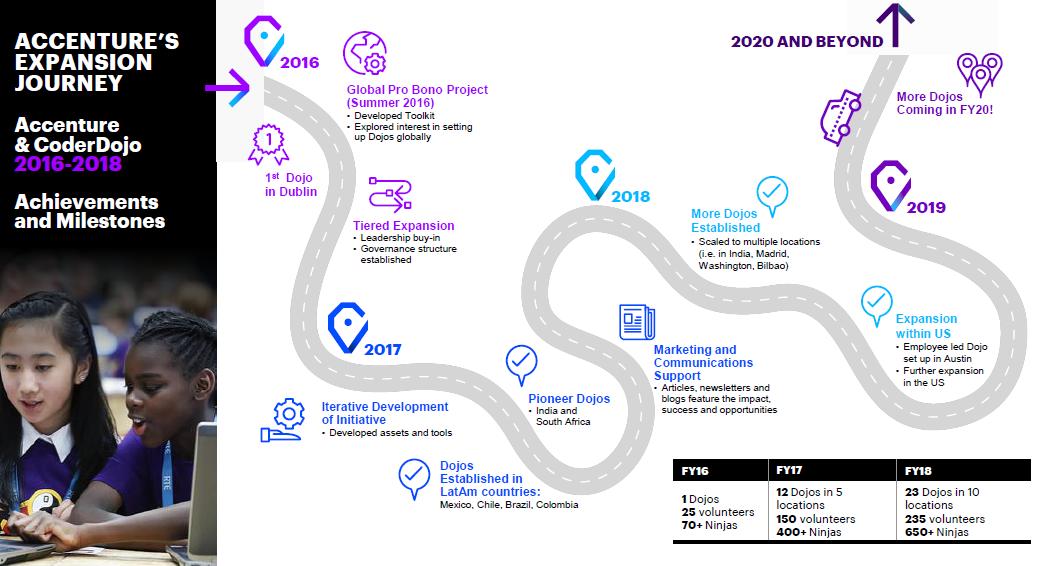
that shape our world are all done by humans: Why not you or me?”
It has had a similar impact on 11-year old Zara Ilyas, who recently travelled from Dublin to Belgium to collect another Coolest Project Award for website she created and now dreams of a career in science or engineering. “We loved our instructor,” she says. “She was really nice and taught us about robotics and how to make circuits to put real lights in the tracing paper windows of a model Christmas house we built.”
To get involved in CoderDojo as an employer, sponsor, volunteer or trainee visit: www. coderdojo.com

